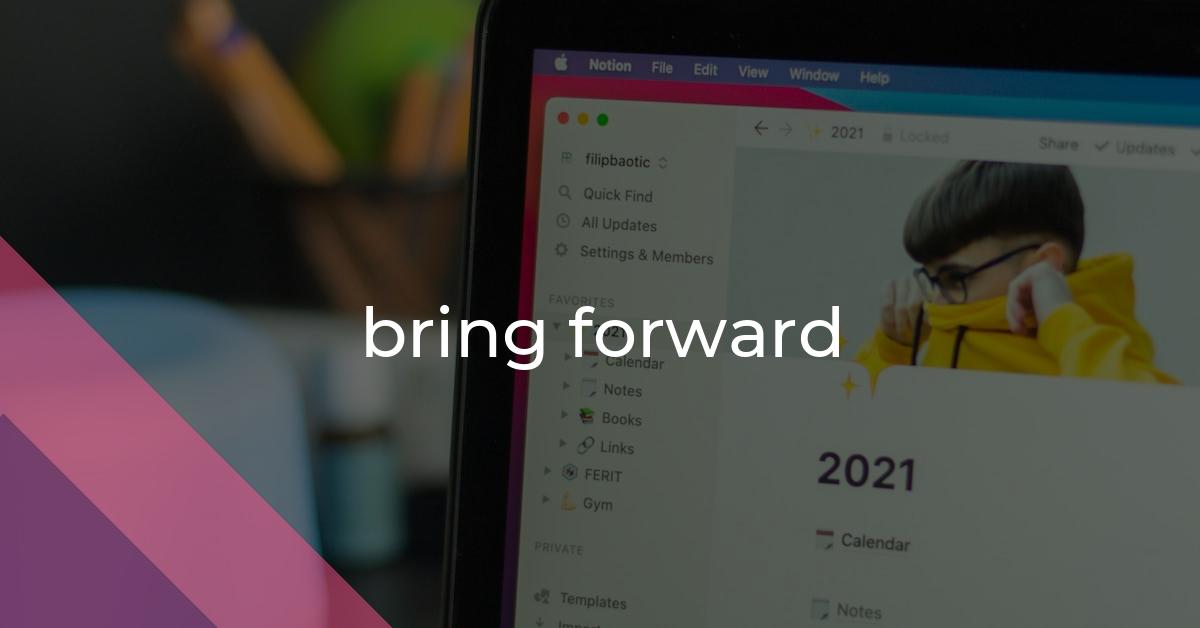bring forward: Idiom Meaning and Origin
What does ‘bring forward’ mean?
The idiom bring forward means to reschedule or move an event, appointment, or meeting to an earlier time or date.

Idiom Explorer
The idiom "put the clock forward" means to adjust the time on a clock or watch to a later time, usually in order to account for daylight saving time or to keep up with the correct time.
The idiom "lead up to" means to precede or prepare for something, typically an event or action. It implies a progression or sequence of events that culminate in the main event or action.
The idiom "in the offing" means something is likely to happen or is about to occur, especially in the near future.
The idiom "hold over" means to delay or postpone something. It can be used to describe the continuation of a person's term in office or the extension of a deadline or appointment.
The idiom "hold off" means to delay or keep something or someone at a distance. It implies waiting or resisting until a more suitable time or condition.
The idiom "get ahead of oneself" means to anticipate or plan for a future event before the appropriate time, often resulting in excessive excitement or overconfidence. It implies acting prematurely or making assumptions without waiting for all the necessary information.
The idiom "fall behind" means to fail to keep up with someone or something, usually in terms of progress or a schedule.
Astounding Revelation
The idiom "bring forward" is a commonly used phrase in the English language. It has its roots in the verb "bring," which means to move an object or person to a certain location. The word "forward" indicates a direction towards the front or in advance. When combined, "bring forward" takes on a figurative meaning that is commonly associated with presenting or proposing something earlier than originally planned or expected.
This idiom is often used in various contexts, including conversation, writing, and formal situations. It can be utilized to describe the act of introducing a topic or an idea earlier than scheduled in a discussion or presentation. For example, in a meeting, a participant might say, "I would like to bring forward a new suggestion for improving our productivity." This sentence implies that the suggestion will be presented earlier than initially intended.
The idiom can also be used to express the act of rescheduling or moving an event, appointment, or deadline to an earlier time. For instance, an organizer might say, "We need to bring forward the deadline for the project due to unexpected delays." In this case, the phrase indicates a change in the timeline, advancing the original due date.
Furthermore, "bring forward" can be employed in legal proceedings to refer to the presentation of evidence, witnesses, or arguments before their scheduled time. In a courtroom, a lawyer might say, "We would like to bring forward a crucial witness to testify." This statement indicates the intention to present the witness earlier than anticipated.
The idiom "bring forward" originated from the literal sense of physically moving something towards the front or advancing it in a spatial sense. Over time, it evolved into a figurative expression that conveys the act of introducing, suggesting, or rescheduling something earlier than planned. Its usage has become widely accepted in various domains, making it an essential part of the English language.
While the idiom "bring forward" is well-defined in its meaning and usage, it also opens the door to further exploration. Its versatility allows for different interpretations and applications in different scenarios. The possibilities for utilizing this idiom creatively are endless, as it can be adapted to fit various situations and contexts.
"carry forward" is another idiom that may be closely related to "bring forward." While "bring forward" focuses on the act of presenting or proposing something earlier than planned, "carry forward" pertains to the act of continuing or progressing with a task or idea. The two idioms share a commonality in terms of moving something ahead or advancing it in some way.
In some cases, "bring forward" and "carry forward" may be used together in a sentence to convey a specific meaning. For example, one might say, "Let's bring forward our innovative ideas and carry them forward to ensure progress." In this sentence, "bring forward" implies the introduction of ideas earlier than intended, while "carry forward" indicates that these ideas should be continued or advanced in the future.
Another idiom that relates to "bring forward" is "put the clock forward." This phrase refers to the act of moving the time on a clock ahead by one hour to account for daylight saving time. While "bring forward" can be associated with advancing or moving things ahead, "put the clock forward" specifically applies to time adjustments.
"bring on" is an idiom that shares similarities with "bring forward." While "bring forward" emphasizes the act of presenting or proposing something earlier than anticipated, "bring on" focuses on the act of initiating or causing something to happen. Both idioms involve introducing or starting something, albeit in different contexts.
A phrase that is closely related to "bring forward" is "bring about." It carries a similar meaning but emphasizes the action of causing or producing something. While "bring forward" is often used to introduce or propose an idea earlier than planned, "bring about" suggests the act of causing a specific outcome or result.
Lastly, the idiom "hold over" can also be connected to "bring forward." While "bring forward" implies the act of presenting or proposing something earlier than intended, "hold over" suggests the postponement or delay of an event or action. The two idioms share a common theme of altering or adjusting the timing or schedule of something.
Example usage
Examples of how the idiom "bring forward" can be used in a sentence:
- I have an important meeting tomorrow, so I will need to bring forward my dentist appointment.
- The project deadline has been brought forward by a week, so we must work extra hours to meet the new timeline.
- Due to a scheduling conflict, we had to bring the annual conference forward from October to September.
More "Verb" idioms



